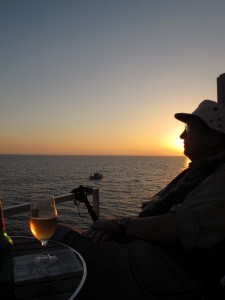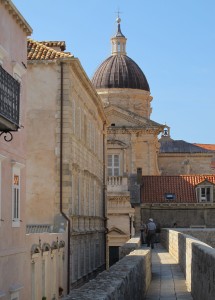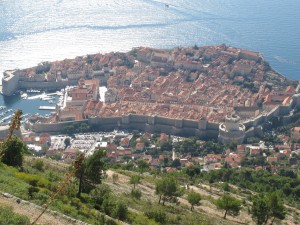




 Fly into Dubrovnik, airport surrounded by spires of cypress & domes of pines. Zig zag along coast, misty & scenic & stippled with islands, to old city. Fight our way through tourists beside the walls who have just poured out of dozens of buses – 3 or 4 cruise liners each holding 5 – 6000 people have docked today, says waiter where we collapse for coffee. They shuffle like caterpillars after leaders who hold aloft flags or furled umbrellas. They bring in no money at all, says waiter, they get everything from the ships – bottled water, food, souvenirs. Tall, small, young, old, hugely fat, normal, whites, Asians, no blacks.
Fly into Dubrovnik, airport surrounded by spires of cypress & domes of pines. Zig zag along coast, misty & scenic & stippled with islands, to old city. Fight our way through tourists beside the walls who have just poured out of dozens of buses – 3 or 4 cruise liners each holding 5 – 6000 people have docked today, says waiter where we collapse for coffee. They shuffle like caterpillars after leaders who hold aloft flags or furled umbrellas. They bring in no money at all, says waiter, they get everything from the ships – bottled water, food, souvenirs. Tall, small, young, old, hugely fat, normal, whites, Asians, no blacks. 
Virtually no hotels in old Dubrovnik, but people let their rooms. Walk through a gateway under ponderous city walls, and I sit with our cases at the Rector’s Palace, a long portico with birds and animals on the capitals, as Bob goes off in search of a room. Eventually having asked in a bar he is found by Viktor who has a damp crummy flat entered by a beautiful ancient vestibule.
Buildings are restrained baroque, handsome, dignified. No motor traffic, it’s not allowed, just men pushing at carts and trolleys loaded with drinks etc. All is marble, and the streets gleam like ivory – Bob thinks it’s been raining.
Supper at an alleyway off the Stradum, the main street. Greensleeves is played on a guitar by a man sitting on the steps of St Blaise, patron saint of Dubrovnik and of coughs and colds. St B raises his hands in blessing from walls, from the gates, the harbour and over the sailors.
Next day we walk the top of the thick walls. I love walking walls – Lugo, York, Chester, Jerusalem – and the way they define  the city they encircle. Here, guns at the ready for Venice, Serbia, Ottomans. At our feet Dubrovnik – Ragusa – tiny, squashed and perfect. Most roofs are bright orange, but some are a faded multi shaded ochre because they were not shelled in the l99l attack by Bosnia/Montenegro. Church towers and spires face us. Out southwards the sea shimmers and promontories fade one after another.
the city they encircle. Here, guns at the ready for Venice, Serbia, Ottomans. At our feet Dubrovnik – Ragusa – tiny, squashed and perfect. Most roofs are bright orange, but some are a faded multi shaded ochre because they were not shelled in the l99l attack by Bosnia/Montenegro. Church towers and spires face us. Out southwards the sea shimmers and promontories fade one after another.
That evening we lose each other hunting for a bar by the sea. Bob strides and never looks  behind and we end at different bars through gaps in the wall overlooking the sea. A cruise liner like a ghost ship lights up then fades into the distance. What one sees, so magical, but to be there, what hell. Well, for us.
behind and we end at different bars through gaps in the wall overlooking the sea. A cruise liner like a ghost ship lights up then fades into the distance. What one sees, so magical, but to be there, what hell. Well, for us.
15th
Out by boat to island of Lokrum. Ten minutes to this island with ruined Benedictine monastery. Botanic garden not up to much but all is free & wild & empty after the city. Stagger down steps to prickly rocks and I swim in clear emerald water, I could have been starkers. Old olive plantations with a mass of spiralling scented ladies tresses. Walk up to fort at top of incline & again these mythic views of receding promontaries. Mule tracks are lumpy, hard for walking.
Boat back. Chatted up by woman & husband, how they paid only this for this and only that for that. Whitebait & draught beer at harbour restaurant.
Bob not feeling well so I go alone to concert in Domnio church. Viktor lends me a brolly. 2 guitars, oh serious & professional, they play as if playing for themselves alone and I think that is the secret – you are playing for yourself and the music rather than the audience – so, adaptations of Bach etc, and one guitarist is tall, thin lipped, receding hair and mostly shuts his eyes while playing and I think, ah, this is the culture of old east Europe, it has survived, even if they are only playing for tourists and must speak to us in English. They teach at the music academy. A storm. Outside lightening flashes through the bull’s eye window and thunder booms and then sometimes it sounds as if a mass of rifles are spitting at us, and still they play, and the noise is like tinnitus but through it we hear the clarity, subtlety of the music. So, as well as the hoards from the liners, there is this, and 100 people to clap and appreciate. The guitarists stand and bow. I never realised guitar, which is Spanish, could express such a range of feeling from passion to Bach’s orderly sublime steps through life.
Viktor talks of the war – before the war he went to church every week, now he does not. He likes people, it does not matter their religion. The war of Independence was a religious war, orthodox v catholic he says, and I think of it stemming from the splitting of the Roman Empire into east and west. Viktor likes the English (well obviously people of our age are quiet and don’t have wild parties), but the Irish get very drunk and make a mess. (Actually, the Irish love Croatia – poor little Catholic country which has fought for independence). He says he is against religion and for business. He looks unkempt, older than the 55 he says he is, and has a crucial tooth missing.
Wed. Bus to bus station in new port, where liners like whales loom over us. Everyone carries a brolly, ominous. Bus to Split, en route going through Serbia (double passport control), which has a slit of land reaching the sea. Clouds like grey ghosts. It rains and comes down like curtains falling perpetually on a digital display. Elongated islands. (Geology?). No room for cultivation or crops, just cliffs and rocks. There is barely a coastal shelf.
Split.
Walk from bus along the water front, the Riva, backed by Diocletians’s palace, a ghost building from which cafes and ice cream stalls and gift shops have been carved. Above, rows of colonnades still run, you can actually see shape of the palace. 

 A bed. Hotel Adriana? We eat on the Riva, and watch the water go through changes of blue, and glitter like Christmas decorations – the acme of what a Mediterranean holiday should be. But our room has a retch inducing smell of drains and dead rats. Or maybe it’s just the sulphur which supplies the sulphur baths. So, next day, we go to Hotel Bellevue.
A bed. Hotel Adriana? We eat on the Riva, and watch the water go through changes of blue, and glitter like Christmas decorations – the acme of what a Mediterranean holiday should be. But our room has a retch inducing smell of drains and dead rats. Or maybe it’s just the sulphur which supplies the sulphur baths. So, next day, we go to Hotel Bellevue.
So, in hotel Bellevue facing the sea, before it a vast empty Italianate square like a de Chirico painting where a nymph should be reclining on a plinth. I like the Bellevue, turn of century and faded. Our room has a broken mirror and missing drawer, and the dust on the legs of the chairs legs is like pale velvet. The lugub rious male staff are all over sixty.
rious male staff are all over sixty.
Diocletian’s palace with its decumanus running east to west still there but misshapen by later buildings, the gold northern gate where the great man entered, the silver gate, the iron gate and the bronze gate where he entered by sea. Day after day we wander this palace village, with walloping great arches lurching this way and that, over and under, truncated there, or leading to nowhere, it is a Piranesi building. Now at this spot, it says, the last emperor of the eastern tetrarchy was murdered, by his own soldiers – and I realise that blood stains and cries really do linger on through the centuries, and that is why I am so glad to sleep in the Bellevue. (Bob says, but people are murdered everywhere). Professional singers in the vestibule of the palace – they sound like the Men of Harlech, a good male growl.
Sunday, and the mausoleum/cathedral is packed for services. We go in the small temple of Jupiter with its barrel roof of masks of looking down – what do they mean, say? Tendrils round the door, birds and branches. The ticket man asks, where do you come from. England. Ah yes, he says, I can hear your cockney accent. My accent is English, I say, or dinary received English, and it is not cockney. No, he insists, I can hear the cockney in your voice, it’s like Michael Caine.
dinary received English, and it is not cockney. No, he insists, I can hear the cockney in your voice, it’s like Michael Caine.
Monday, by bus no. 1 to Salona, Diocletian’s birthplace. Off we go, stop start, through industrial district and beyond are mountains with quarries of this cream marble, and we pass the great Roman aqueduct – suddenly here it’s marching by the bus. Bob pushes up and signals we must get out. We make our way, via buildings, road works, traffic, allotments and find the aqueduct, it’s brick, elevated, and now it’s disappeared, and now, here the splendid thing is marching along in pure limestone, and still in use, bringing half of Split’s drinking water from the mountains, as it did in Roman times. So they say. We are awed by the precision, the engineering, the beauty of this pale limestone.
Bob now has had enough, so he gets a bus back via an underpass, and I somehow get a bus to the Roman town of Salona. And here it is, Diocletian’s birthplace, which became sacred to Christians after he threw some of the earliest martyrs to the lions. Or to gladiators? About 100 years later, when Christianity took over, the church forbid fighting to the death – so, a sense of progress and enlightenment. Because of these early martyrs, lots of Christian basilicas and graves. Meanwhile, a lovely girl and her swain are dallying among the tombstones – he implores, she smiles, ruffles his hair. Something eternal here.
 Ferry to island of Korchula, finally bus and ferry and bus
Ferry to island of Korchula, finally bus and ferry and bus (bus is driven onto the ferry) and back to Dubrovnik. Via vineyards and mussel farms. This time we stay in Tomas’s light, clean airy flat in the old city overlooking the Stradum, which I find through a shop which among other things has a notice Accommodation. The next day Tomas arrives with a large bag, and I start saying all the things the flat could do with, such as an electric kettle. He does not understand. ‘you have all you need here.’ Then out of the bag he draws a 2014 calendar of Dubrovnik, biscuits, cakes, gifts for us. We rapidly backtrack. He talks. We listen for an hour to his part in the siege of Dubrovnik, when out of the blue it was attacked by Serbia. It was madness, he says, brother fighting brother. Go up by funicular, to see it all, he says, so I do, ranges of mountains going on for ever, a fort looking down on the city. Going in a funicular is like looking through a microscope, as the old city becomes smaller and smaller going up, and then larger and larger going down.
(bus is driven onto the ferry) and back to Dubrovnik. Via vineyards and mussel farms. This time we stay in Tomas’s light, clean airy flat in the old city overlooking the Stradum, which I find through a shop which among other things has a notice Accommodation. The next day Tomas arrives with a large bag, and I start saying all the things the flat could do with, such as an electric kettle. He does not understand. ‘you have all you need here.’ Then out of the bag he draws a 2014 calendar of Dubrovnik, biscuits, cakes, gifts for us. We rapidly backtrack. He talks. We listen for an hour to his part in the siege of Dubrovnik, when out of the blue it was attacked by Serbia. It was madness, he says, brother fighting brother. Go up by funicular, to see it all, he says, so I do, ranges of mountains going on for ever, a fort looking down on the city. Going in a funicular is like looking through a microscope, as the old city becomes smaller and smaller going up, and then larger and larger going down. 
Croatia! They have so little sense of identify, other than to where they live, Split or Dubrovnik or wherever. It’s so new, there’s little cohesion. It’s uncertain. They want to be part of the west, even the EEC, but are they haunted by the east (Serbia, Montenegro) which is ever ready to pounce, to absorb them. And the only thing which brings in any currency is tourism, which spoils the thing it comes for, and also, with wars or recessions, could vanish overnight.
Copyright Sarah Coles 2018 Privacy Policy Website Design & Creation Forum Media and Design - Alresford